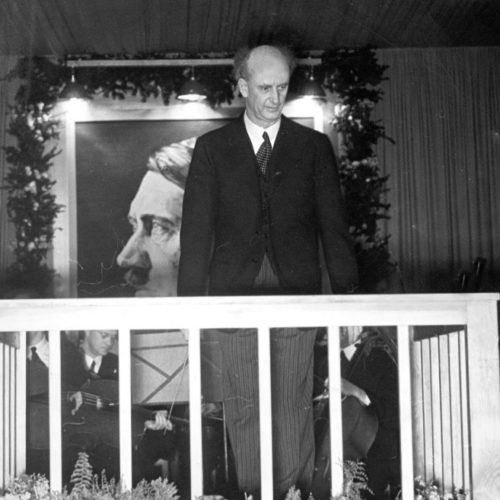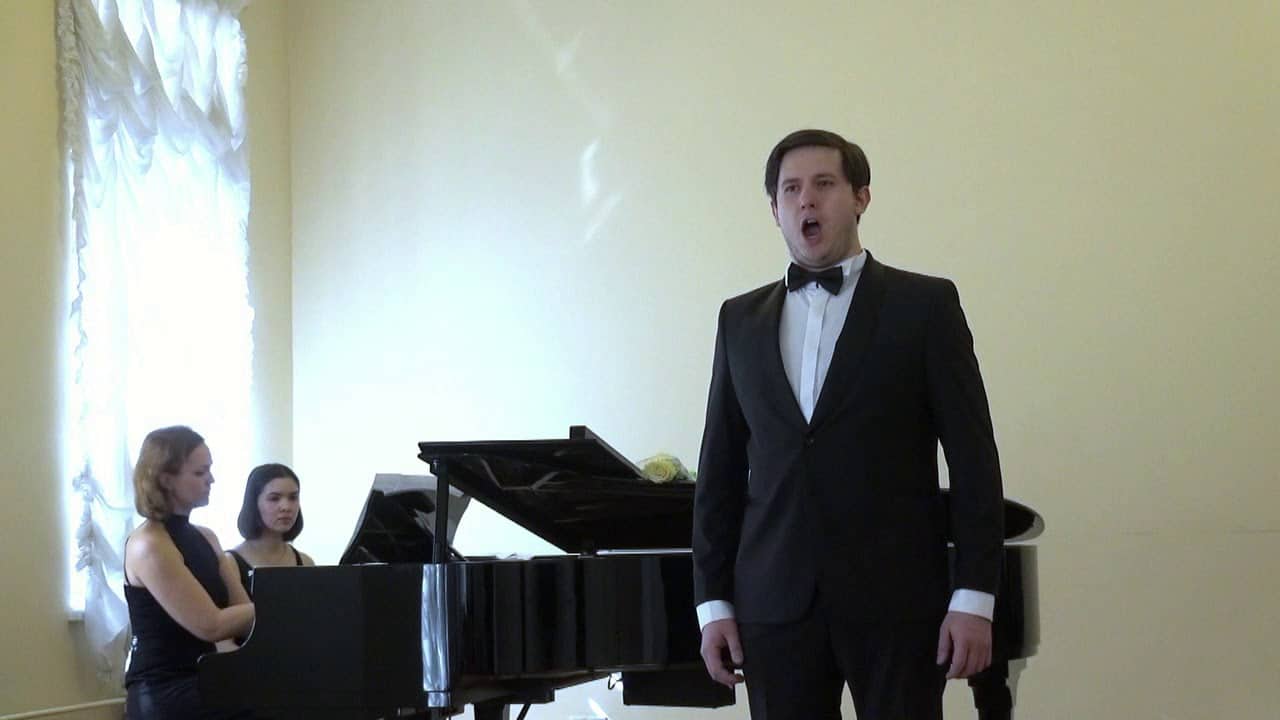On Kristallnacht, a new look at German music under the Nazis
NewsBerlin last night hosted the cinema premiere of ‘Klassik unterm Hakenkreuz’. In English: Music under the Swastika — The Maestro and the Cellist of Auschwitz’. The federal minister for culture, Claudia Roth, was among those in attendance.
Written and directed by Christian Berger, the Deutsche Wele film sheds new light on oppressors and victims – and those who claimed to be inbetween.
Interviewees for the film included Anita Lasker-Wallfisch, Christian Thielemann, Daniel Barenboim, Wilhelm Furtwängler’s step-daughter, Albrecht Dümling and Norman Lebrecht.
There is a wealth of archive material, much of it unseen and unheard before.
Take 90 minutes and watch this. It sheds new light on the shoddy deal struck between artists and mass murder. The contrasting narratives of the Auschwitz cellist Anita Lasker and the all-powerful conductor Furtwängler is spectacularly effective.
Just watch.






Not much in here that’s new if you have any knowledge of music at this time, tbh.
Meanwhile the U.S. based fast food chain KFC “celebrated” Kristallnacht and the beginning of the Holocaust by offering a “cheesy chicken” promotion in their German establishments.
They now have had to apologise and remove the extremely offensive “cheesy chicken” promotion to “celebrate” Kristallnacht and they are blaming it on a bot. No matter how this came about, we have reached a level of depravity and insanity that is truly unfathomable. The BBC speaks about it here:
https://www.bbc.com/news/world-europe-63499057
Furtwängler bashing, again. He wasn t a Nazi. And he was the best. Face it
The film never says he was a Nazi but he made some wrong choices. But, as Anita Lasker says, we can’t judge him because we don’t know what pressures he was under.
But we do know about the pressures. Furtwaengler refused to sack Jewish players from his orchestra until it was made clear to him that his life might be in danger. Finally, he gave each player a letter of recommendation to secure employment wherever they found themselves. Imagine that – a recommendation from the greatest German conductor! His own racially Jewish secretary, Bertha Geissmer, eventually became secretary to Sir Thomas Beecham. She wrote her own account of those troubled times – ‘The Baton and the Jackboot’. I would suggest that this phenomenal book is an exceptional source of information about Furtwaengler and anyone seeking to understand Furtwaengler and his relationship with the Nazis should read it before rushing to judgement.
Then there’s Ken Shirakawa’s book ‘The Devil’s Music Master’ – an essential read.
Furtwaengler never joined the Party, as far as I know, and continued defying the Nazis until he had to flee to Switzerland when he found that the Gestapo were on his case. He probably believed that music was the last oasis of sanity in the hell-hole of a country in which he lived. He did as much as he could to avoid active participation in the Nazis’ murderous machinations. In some ways, his fate was similar to that of Shostakovich a generation later. Nobody seems to denounce him for reaching an alleged ‘accommodation’ with the Soviet authorities or not leaving Russia.
If we are going to excoriate out-and-out Nazi collaborators in the musical world, there are plenty of big names who would far better fill the bill than Furtwaengler.
Thanks for these book recommendations!
Way too many Nazis in Germany and Austria at the time for my taste!
He may have very well been a Nazi in disguise and in any case Sir Rattle is the best. A true British and most certainly not a Nazi. And I hope Sir Rattle is an MI6 agent sending some secrets back to England while living in Berlin.
Indeed.
I wonder what people will say in about 70 years time about Rattle remaining in post in Birmingham, during Margaret Thatcher’s premiership. He won’t be around to defend himself, and some people are EXTREMELY anti-Thatcher…
I’m not a fan of Thatcher but I don’t think she is equal to Hitler and the Nazi party in fairness…
No, WF was just your typical run of the mill 1930’s German anti-Semite who lamented not being able to perform with Schnabel & Menuhin and losing Feuermann but as for the rest in the BPO he shrugged his shoulders and didn’t ask questions when the deposed players instruments suddenly became available. He nobly stayed to protect German culture until the ss came for him and he left for Switzerland. When comparisons between WF and AT are discussed inevitably the superior intellectual background of WF is trumpeted and AT portrayed as an ignorant conducting savant, despite his conservatory studies, who liked to watch wrestling on television. Nonetheless, the record is clear as to which one recognized the dangers of fascism and used his art to defeat it.
He decided to let people die and save his own skin. A pathetic human being.
Fascinating: many photos and films never seen before. Surprising it was allowed on YouTube so quickly.
A well made film about music under the Nazis can bring to the attention of a wider audience a very tragic and important period in music history. In that sense, it can make a most welcome contribution.
Let us hope that they have drawn on the extensive research undertaken on this subject the last 5 decades. I remember the days when Fred Prieberg’s Musik im NS-Staat (1982) was the only book length study on this subject—a pioneering work. Since then the bibliography has grown impressively.
The English and German wikipedia articles list many important studies on this subject.
https://en.wikipedia.org/wiki/Music_in_Nazi_Germany
https://de.wikipedia.org/wiki/Musik_im_Nationalsozialismus
Just a purely technical take on this film. I WISH they didn’t feel the need to colorize all of the B&W footage and photographs. Some of it works, but some is pretty lousy in quality, and is not necessary. Also, all of the audio from old musical clips is subjected to overdone added reverb, done in such a way as to completely blunt the impact of the performances. It certainly doesn’t improve anything. This seems to be a recent trend. I hope the producers stop doing this in the future.
Paul Nettl, in his invaluable book “The Book of Musical Documents” (1948) has a section titld “Music in a Degenerate World” devotes an entire chapter to music during th Nazi era. What I found fascinating was the profoundly anti classical music position of the Hitler Youth, as expressed in an excerpt from the magazine “Musik Kultur.” It is a complete rejection: “The Hitler Jugend rejects concert and opera music in its present form. … We do not want antiquated forms of musical culture, for a young generation and an art-hungry people. We no longer have any use for the old music because political ideas have changed.”
Other portions’s of Nettl’s chapter are along similar lines. Surely Furtwängler was aware of this. Whether that was a reason for staying or fleeing is the hard question. But it suggests that all classical music practitioners were in a sense suspect as was their music, if not in the mind of Hitler at least in what could be called the Nazi “think tanks” (I know — a poor example of “think” but that’s the phrase). It also gives a hint of what things would have been like after Hitler had Germany prevailed.
I always feel that not enough is made of the fact that John Eliot Gardiner’s father Rolf was a Nazi sympathizer long before it became “cool” (among the British upper class), and that this may have decisively influenced J.E.’s striving for “purity”, a “clean slate”, “restoring the (musical) lineage”, etc.
That’s quite an accusation towards J.E. Gardiner. Even if I did harbor such a speculative thought, no way would I blurt it out to the world. Maybe your values do need to be privatized.
“If the fight
against Judaism
concentrates on those artists
who are themselves rootless
and destructive and who
seek to succeed in kitsch,
sterile virtuosity and the
like, then it is quite
acceptable; the fight against these people and the attitude they embody cannot be pursued
thoroughly or
systematically enough. If,
however, this campaign is also directed at truly great artists, then it ceases to be.”
(Furtwangler, 1940)
Where the fascism that finds a home in art blends with national socialism.
Let’s get this out in the open, did Furtwaengler protect – or help protect – Jewish players within the Berlin Philharmonic, or did he not? If so, wouldn’t that be something of an example of, ‘actions speak louder than words’?
Not much new, but a nice presentation of A. L.-W., among other things. However, the clichés (starting with the Walküre Prelude, calming things with the Hebrides etc.) I found a bit hard to digest. (And on which map is Breslau “East of Berlin” ?) In any case, certainly a subject that remains to be discussed. On a side note, most of Wagner’s Jew-hatred laden pamphlet was based on previous publications starting in the early 19th century, so I disagree with the view that he was “starting” anything as an influencer. (Which in no way excuses his anti-Semitism, it merely puts in in perspective as far as its importance to later developments goes. And yes, no doubt the pamphlet acted as an excuse for some folks at the time or later for their bigotry.) I also believe that the great conductors of that time – i.e. the refugees (Walter, Reiner, Szell, Klemperer, Koussevitsky, Ormandy, Solti, Steinberg, Leinsdorf, Rosenstock, Blech, Horenstein, Rodzinski, de Sabata, Dorati etc., not to mention the non-Jewish ones from Toscanini to Kleiber, Busch etc.) all continued to conduct Wagner, despite their own tragic experiences. Their moral judgement seems to me to encompass a more legitimate point of view, than the anti-Wagnerian attitude of later generations.
The German city Breslau is now called Wrocław, and it is in Poland. On any map that had Breslau, it was east of Berlin. Same goes for Wrocław, Poland.
The opening sentence by Norman Lebrecht is false, isn’t it?
The whole German music establishment over night turned into Nazi collaborators?
That’s as undifferentiated and hyperbolic as it gets. Reality was far from it.
I wish us clueless people in the west having grown up in a post war bubble of relative freedom and democracy would humble ourselves more in face of a very differentiated spectrum of possibilities for people to live and survive with their families under totalitarian rule.
If you had a name, I would justify my statement to you. I will not argue with a nameless person.
Apologies, but this is the internet, I will not give my real name. I gladly discuss any subject in (actual) person with knowing who is present in the conversation and who has access to the record of it for all eternity. The internet knows no real privacy.
As for the topic: it can’t really be challenged by any serious musicologist, that not ALL of German music establishment were collaborators with the Nazis over night. That’s not really a topic up for reinterpretation for whichever reasons, since the facts are known. Also the argument “those who were not against it were for it” is incorrect and revisionist.
since when does government rule personal morals. good is good and bad is bad. do not do unto others that which is hateful to yourself
https://basiaconfuoco.com/2019/01/24/voice-in-the-wilderness-music-as-salvation/
https://basiaconfuoco.com/2017/10/03/szymon-laks-music-of-another-world/
I heard from a reliable source who attend the Berlin premiere that the living WF family members insist on defending the premise that WF did not know what was happening to the Jews. Also heard the moderator thwarted discussion about this salient point, and champagne was served.
https://www.youtube.com/watch?v=Ag-m3H9SH84